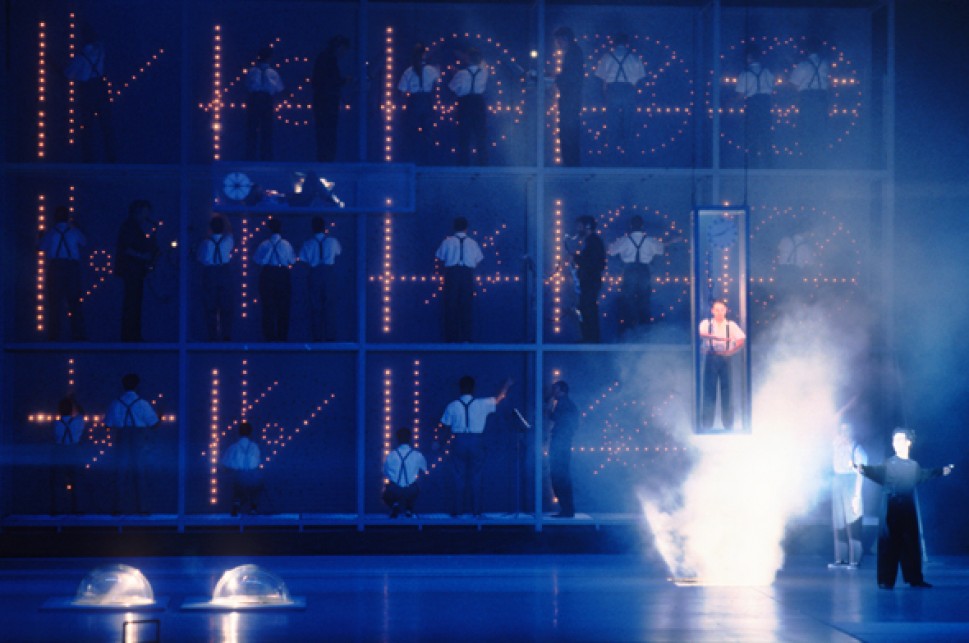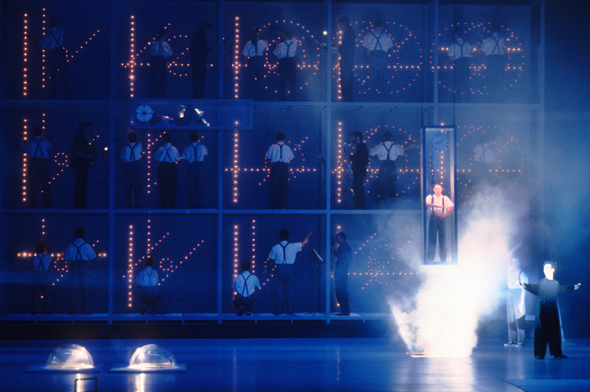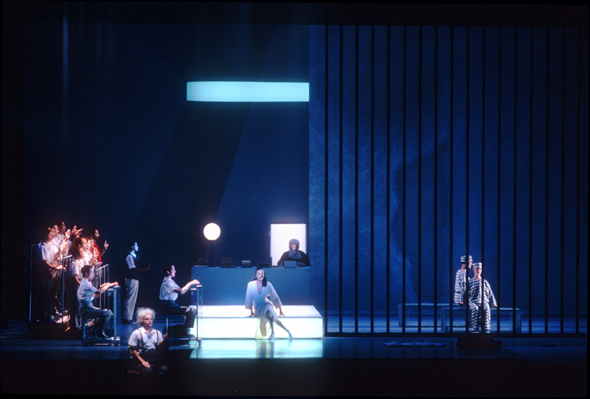EINSTEIN ON THE BEACH
An Opera in Four Acts by Philip Glass & Robert Wilson Choreography by Lucinda Childs
For the First Time in Two Decades, Full Production of the Rarely Performed Work Will Tour Internationally in 2012-2013
The Philip Glass/Robert Wilson collaboration Einstein on the Beach, An Opera in Four Acts is widely recognized as one of the great creative achievements of the 20th century. An international breakthrough for two of America’s most celebrated artists, the production, in turn, radically and indelibly broadened what audiences might expect from opera, theater or performance art. John Rockwell, who reviewed the 1976 world premiere for The New York Times, has called Einstein on the Beach “timeless” and “an experience to cherish for a lifetime.” The production’s only two revivals to date, in 1984 and 1992, proved equally enthralling to audiences and critics. Although every performance of the work has attracted a sold-out audience, and the music has been recorded and released, few people have actually experienced Einstein live. New audiences and an entirely new generation will have the opportunity during a 2012-2013 international tour in which New York-based producer Pomegranate Arts will bring the work to major cities around the world.
Opéra et Orchestre National de Montpellier Languedoc-Roussillon is scheduled to present the world premiere of Einstein on the Beach at the Opera Berlioz Le Corum on March 17 and 18, 2012. From May 4—13, 2012, the Barbican will present the first-ever UK performances of the work in conjunction with the Cultural Olympiad and London 2012 Festival. The North American premiere at the June 2012 Luminato, Toronto Festival of Arts and Creativity represents the first North American presentation ever held outside of New York City. The Brooklyn Academy of Music (BAM) 2012 Next Wave Festival will once again be home to the New York premiere, having presented the 1984 and 1992 iterations. Having never before been presented on the West Coast, the production will run for two weeks in the fall of 2012 at Cal Performances on the University of California, Berkeley campus.
The tour is currently slated to conclude at Amsterdam’s De Nederlandse Opera/The Amsterdam Music Theatre in January 2013. Before the tour, in January 2012, the entire Einstein on the Beach company will be in residence at the University of Michigan, Ann Arbor, whose University Musical Society will host technical rehearsals and early previews.
Einstein on the Beach defies the rules of conventional opera. Instead of a traditional orchestral arrangement, Glass chose to compose the work for the synthesizers, woodwinds and voices of the Philip Glass Ensemble. Non-narrative in form, the work uses a series of powerful recurrent images shown in juxtaposition with abstract dance sequences created by American choreographer Lucinda Childs and constructed in the classical principle of theme and variation. The opera consists of four acts that are connected by a series of short scenes or “knee plays.” The performance lasts nearly five hours and has no traditional intermissions; instead, the audience is invited to wander in and out at liberty.
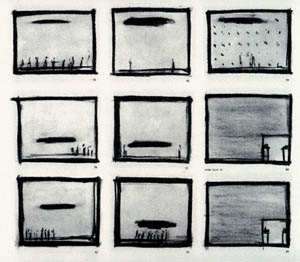
Images © Byrd Hoffman Foundation, Inc. Source: Katharina Otto-Bernstein, Absolute Wilson: The Biography, (Munich: Prestel, 2006), p. 145.
Originally produced by the Byrd Hoffman Foundation, Einstein on the Beach was first performed in 1976 at the Festival d’Avignon in France, followed by a European tour that summer culminating, in the fall of the same year, in a presentation at the Metropolitan Opera in New York.
Einstein on the Beach was the first collaboration between Glass and Wilson. For the new production, they are working with a number of their longtime collaborators, including Lucinda Childs, who will serve as choreographer, as she did in 1984 and 1992. All of these artists are now in their `70s; the production will be a cornerstone of Glass’s 75th birthday year. They are committed to passing on the work to a new generation, and so are recruiting younger artists for the creative team and cast.
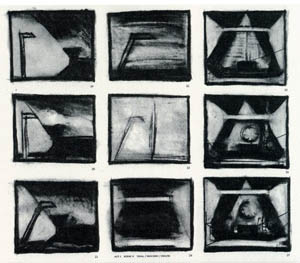
Images © Byrd Hoffman Foundation, Inc. Source: Katharina Otto-Bernstein, Absolute Wilson: The Biography, (Munich: Prestel, 2006), p. 145.
Philip Glass shared his enthusiasm about the production: “For Bob and me, the 2012-13 revival of Einstein on the Beach will be a most significant event, since in all likelihood, this will be the last time that we will be together and able to work on the piece. For audiences, few of whom have experienced Einstein apart from audio recordings, this tour will be a chance finally to see this seminal work.
In this production, my composition will remain consistent with the 1976 original. The technology of theater staging and lighting has improved to such an extent that it will be interesting to see how Bob uses these innovations to realize his original vision.
Finally, without the tremendous commitment, stamina and ingenuity of Linda Brumbach’s Pomegranate Arts team, and the commissioning partners she has brought together to support this effort, this final revival would not be taking place at all. For them I am deeply grateful.”
Robert Wilson commented, “Philip and I have been always been surprised by the impact that the opera had and has. I am particularly excited about this revival, as we are planning to re-envision Einstein with a new generation of performers, some of whom were not even born when Einstein had its world premiere.
Aside from New York, Einstein on the Beach has never been seen in any of the cities currently on our tour, and I am hoping that other cities might still be added. I am very curious to see how, after nearly 40 years, it will be received by a 21st century audience.
I am very grateful to Linda Brumbach and my manager Jörn Weisbrodt for believing in this revival from the first moment and making this dream come true in the new millennium.”
Linda Brumbach, Director of Pomegranate Arts and the Executive Producer of the 2012-13 Einstein on the Beach, said, “Einstein on the Beach is one of the most important operas of our lifetime. It has achieved canonical, even mythic, status, and yet so few people have had the opportunity to see it. It is a gift to work with artists that have such a singular vision as Philip Glass, Robert Wilson and Lucinda Childs, especially on this monumental production. I’m grateful for the heroic, committed and adventurous international commissioning partners and for the generous support of the Byrd Hoffman Watermill Foundation, Chuck Close, Douglas Gordon, Frank Gehry and Robert Wilson.”
Produced by Pomegranate Arts, Inc., the 2012 production of Einstein on the Beach, An Opera in Four Acts was commissioned by BAM; the Barbican, London; Cal Performances University of California, Berkeley; Luminato, Toronto Festival of Arts and Creativity; De Nederlandse Opera/The Amsterdam Music Theatre; Opéra et Orchestre National de Montpellier Languedoc-Rousillon; and the University Musical Society of the University of Michigan.
Books and DVDs:
| [amazonify]3791334506[/amazonify] [amazonify]8434309874[/amazonify] [amazonify]0521367328[/amazonify] [amazonify]084782103X[/amazonify] [amazonify]B001200R3M[/amazonify] |
About Philip Glass
Through his operas, his symphonies, his compositions for his own ensemble, and his wide-ranging collaborations with artists ranging from Twyla Tharp to Allen Ginsberg, Woody Allen to David Bowie, Philip Glass has had an extraordinary and unprecedented impact upon the musical and intellectual life of his times.
The operas—including Satyagraha, Akhnaten, and The Voyage, among many others—play throughout the world’s leading houses, and rarely to an empty seat. Glass has written music for experimental theater and for Academy Award-winning motion pictures such as The Hours and Martin Scorcese’s Kundun, while Koyaanisqatsi, his initial filmic landscape with Godfrey Reggio and the Philip Glass Ensemble, may be the most radical and influential mating of sound and vision since Fantasia. His associations, personal and professional, with leading rock, pop and international music artists date back to the 1960s, including the beginning of his collaborative relationship with artist Robert Wilson. Indeed, Glass is the first composer to win a wide, multi-generational audience in the opera house, the concert hall, the dance world, in film and in popular music—simultaneously.
Glass was born in 1937 and grew up in Baltimore. He studied at the University of Chicago, the Juilliard School and in Aspen with Darius Milhaud. Finding himself dissatisfied with much of what then passed for modern music, he moved to Europe, where he studied with the legendary pedagogue Nadia Boulanger (who also taught Aaron Copland, Virgil Thomson and Quincy Jones) and worked closely with the sitar virtuoso and composer Ravi Shankar. He returned to New York in 1967 and formed the Philip Glass Ensemble—seven musicians playing keyboards and a variety of woodwinds, amplified and fed through a mixer.
The new musical style that Glass was evolving was eventually dubbed “minimalism.” Glass himself never liked the term and preferred to speak of himself as a composer of “music with repetitive structures.” Much of his early work was based on the extended reiteration of brief, elegant melodic fragments that wove in and out of an aural tapestry. Or, to put it another way, it immersed a listener in a sort of sonic weather that twists, turns, surrounds, develops.
There has been nothing “minimalist” about his output. In the past 25 years, Glass has composed more than twenty operas, large and small; eight symphonies (with others already on the way); two piano concertos and concertos for violin, piano, timpani, and saxophone quartet and orchestra; soundtracks to films ranging from new scores for the stylized classics of Jean Cocteau to Errol Morris’s documentary about former defense secretary Robert McNamara; string quartets; a growing body of work for solo piano and organ. He has collaborated with Paul Simon, Linda Ronstadt, Yo-Yo Ma, and Doris Lessing, among many others. He presents lectures, workshops, and solo piano performances around the world, and continues to appear regularly with the Philip Glass Ensemble.
About Robert Wilson
The New York Times has described Robert Wilson as “a towering figure in the world of experimental theater.” His works integrate a wide variety of artistic media, combining movement, dance, lighting, furniture design, sculpture, music and text into a unified whole. His images are aesthetically striking and emotionally charged, and his productions have earned the acclaim of audiences and critics worldwide. Wilson’s awards and honors include two Guggenheim Fellowship awards (’71 and ’80), the Rockefeller Foundation Fellowship award (’75), the nomination for the Pulitzer Prize in Drama (’86), the Golden Lion for sculpture from the Venice Biennale (’93), the Dorothy and Lillian Gish Prize for lifetime achievement (’96), the Premio Europa award from Taormina Arte (’97), election to the American Academy of Arts and Letters (’00), the National Design Award for lifetime achievement (’01), and Commandeur des arts et des letters (’02), the Medal for Arts and Sciences of the city of Hamburg (2009) and the Hein Heckroth-Prize for Set Design (2009).
A native of Waco, Texas, Wilson was educated at the University of Texas and arrived in New York in 1963 to attend Brooklyn’s Pratt Institute. Soon thereafter Wilson set to work with his Byrd Hoffman School of Byrds and together with this school developed his first signature works, including King of Spain (’69), Deafman Glance (’70), The Life and Times of Joseph Stalin (’73), and A Letter for Queen Victoria (’74). Regarded as a leader in Manhattan’s burgeoning avant-garde, Wilson turned his attention to large-scale opera.
After Einstein on the Beach (`76) altered conventional notions of the moribund form of opera, Wilson worked increasingly with European theaters and opera houses. In collaboration with internationally renowned writers and performers, Wilson created landmark original works that were featured regularly at the Festival d’Automne in Paris, the Schaubühne in Berlin, the Thalia Theater in Hamburg, and the Salzburg Festival. At the Schaubühne he created Death Destruction & Detroit (’79) and Death Destruction & Detroit II (’87); and at the Thalia he presented the groundbreaking musical works The Black Rider (’91) and Alice (’92). He has also applied his striking formal language to the operatic including Parsifal in Hamburg (’91) and Houston (’92), The Magic Flute (’91), Madame Butterfly (’93), Lohengrin at the Metropolitan Opera in New York (’98). Wilson recently completed an entirely new production, based on an epic poem from Indonesia, entitled I La Galigo, which toured extensively and appeared at the Lincoln Center Festival in the summer of 2005.
Wilson continues to direct revivals of his most celebrated productions, including The Black Rider in London, San Francisco, and Sydney, Australia, The Temptation of St. Anthony in New York and Barcelona, Erwartung in Berlin, Madama Butterfly at the Bolshoi Opera in Moscow, the LA Opera, Het Muziektheater in Amsterdam, and Wagner’s Ring cycle at Le Chatelet in Paris. For the Berliner Ensemble he created two highly acclaimed recent productions: Brecht’s Dreigroschenoper and Shakespeare’s Sonnets with music by Rufus Wainwright. Both productions received invitations to the Spoleto Festival and travel internationally. Wilson directs all Monteverdi Operas for the opera houses of La Scala in Milan and the Palais Garnier in Paris.
Wilson’s practice is firmly rooted in the fine arts, and his drawings, furniture designs, and installations have been shown in museums and galleries internationally. Extensive retrospectives have been presented at the Centre Georges Pompidou in Paris and the Boston Museum of Fine Arts. He has mounted installations at the Stedelijk Museum in Amsterdam, London’s Clink Street Vaults and the Guggenheim Museums in New York and Bilbao. His extraordinary tribute to Isamu Noguchi has been exhibited most recently at the Seattle Art Museum and his installation of the Guggenheim’s Giorgio Armani retrospective traveled to London, Rome and Tokyo. In 2007, Paula Cooper Gallery and Phillips de Pury & Co in New York held exhibitions of his most recent artistic venture, the VOOM Portraits, with subjects including Gao Xingjian, Winona Ryder, Mikhail Baryshnikov and Brad Pitt. The works have been shown at the Tribeca Film Festival (2006), the Montreal Film Festival (2008) and in galleries and museums in Los Angeles, Naples, Moscow, Singapore, Graz, Milan, Hamburg and will continue to tour internationally over the next years. His drawings, prints, videos and sculpture are held in private collections and museums throughout the world. He is represented by the Paula Cooper Gallery in New York City.
Each summer Wilson hosts students and professional artists from around the world at the International Summer Arts Program at the Watermill Center in eastern Long Island, an interdisciplinary performance laboratory. In July of 2006, the Watermill Center dedicated a brand new building on its grounds, including rehearsal spaces, dormitories and residences, and inaugurated a year-round programming schedule.
About Pomegranate Arts
Pomegranate Arts is an independent production company based in New York City dedicated to the development of international contemporary performing arts projects. Since its inception, Pomegranate Arts has conceived, produced, or represented projects by Philip Glass, Laurie Anderson, London’s Improbable Theatre, Sankai Juku, Dan Zanes, Goran Bregovic, Lucinda Childs and Virginia Rodrigues. Special projects include Dracula: The Music And Film with Philip Glass and the Kronos Quartet; Julian Crouch and Phelim McDermott’s Shockheaded Peter featuring the Tiger Lillies; Drama Desk Award winning Charlie Victor Romeo; Healing The Divide, A Concert for Peace and Reconciliation, including artists Anoushka Shankar and Tom Waits; Hal Willner’s Came So Far For Beauty, An Evening Of Leonard Cohen Songs; and the remounting of Lucinda Childs, Philip Glass and Sol LeWitt’s 1979 classic, DANCE.
EINSTEIN ON THE BEACH: TOUR
(*Subject to Change)
JANUARY 20 – 22, 2012 (Preview)
Presented by: University Musical Society of the University of Michigan
Venue: The Power Center
ANN ARBOR, MI
CLICK HERE FOR TICKETS
MARCH 15, 2012 (Preview)
MARCH 16-18, 2012 (World Premiere)
Presented by: Opéra et Orchestre National de Montpellier Languedoc-Roussillon
Venue: Opera Berlioz Le Corum
MONTPELLIER, FRANCE
CLICK HERE FOR TICKETS
MAY 4-6, 9-13, 2012
Presented by: The Barbican
Venue: The Barbican Theatre
LONDON, ENGLAND
CLICK HERE FOR TICKETS
JUNE 8-10, 2012
Presented by: Luminato, Toronto Festival of Arts and Creativity
Venue: Sony Center for the Performing Arts
TORONTO, CANADA
SEPTEMBER 14-16, 19-23, 2012
Presented by: Brooklyn Academy of Music (BAM)
Venue: Opera House
BROOKLYN, NY
OCTOBER 26-28, 2012
Presented by: Cal Performances University of California
Venue: Zellerbach Hall
BERKELEY, CA
JANUARY 5-7, 10-12, 2013
Presented by: De Nederlandse Opera/The Amsterdam Music Theatre
Venue: Het Muziektheater
AMERSTERDAM, NETHERLANDS

